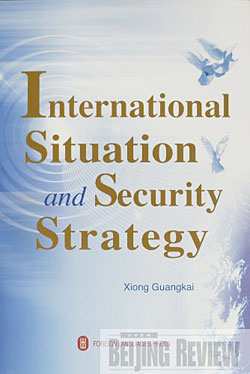|
"Nowadays, the profound changes and complex realignments in the international strategic landscape are the outcome of the interaction of various intertwined factors such as the changes in various countries' interests, strengths and policies, etc., which are attributable to the three deepening trends of world multipolarization, economic globalization and social informationalization," Xiong wrote.
 |
|
BOOK OF INSIGHT: Xiong Guangkai takes an insider's look at the evolving international situation and China's security strategy in his recent book (WEI YAO) |
As shown in these articles, Xiong always analyzes problems, makes forecasts and devises strategies while taking account of the overriding themes of the times-peace and development-as well as the historical trends of multipolarization, globalization and the application of information technology. He also underlines changes in the interests, strengths and policies of major powers in his analyses.
The development of China's national security concept, strategy and policy since the founding of the People's Republic of China in 1949 has been another focus of Xiong's research in recent years. When he served as the Deputy Chief of the General Staff of the PLA, he personally participated in the formulation and implementation of many major national security policies. During his tenure, he gained a unique perspective on the adjustment and improvement of China's national security concept, mechanism, strategy and policy.
"National security strategy and policy is an age-old yet new topic," Xiong writes. "It is old because ever since the establishment of states in human society, national security has been a critical question affecting the life and death of a nation. How to formulate a correct security strategy and policy to manage state affairs and bring about a prosperous and secure society has been a subject long explored by statesmen, thinkers and military strategists around the world. It is also a new topic because national security strategy and policy must embrace new concepts, new thinking and new content in line with new circumstances, changes and characteristics.
"China's national security strategy and policy have fully absorbed the notable achievements made in this field from past to present and throughout the world. They are the result of combining theoretical contributions with successful practice by the leadership of several generations in charge of national security work. It has gradually taken shape, developed and optimized in line with the incessant changes in China's security situation."
Xiong points out that China has made three major adjustments in its security policy along with the development of the domestic and international situations: It pays great attention to both traditional and non-traditional security; it attaches equal importance to military and political security, on the one hand, and security in other fields such as the economy, culture, information, finance, energy, climate and public health on the other hand; and it sees great value in strengthening its own security while closely following international security cooperation.
Over the years, Xiong has been committed to observing military developments across the world and exploring ways for the Chinese military to develop in leaps and bounds. Most of those who have ever been to Xiong's lectures are impressed with his strong command of military affairs. He discusses topics ranging from major military powers' strategic reports, documents and roadmaps on promoting the revolution in military affairs to the specifications of certain hi-tech weapon systems with perfect ease. When he gets excited during his lectures, he can take the audience aback with his overflowing enthusiasm. "On the Revolution in Military Affairs" and "On the World Revolution in Military Affairs and Chinese Military Building" are speeches Xiong gave, respectively, at the Chinese Scientists' Forum on Humanities and the National Defense University of the PLA. While examining the background, history, main features, strategic influence and future trends of the revolution in military affairs, he sheds light on the situation and tasks China faces as it develops its national defense and armed forces and on the policies it should adopt. Xiong has immersed himself in research into the revolution in military affairs over the past 10 years. His studies have not only played an essential role in promoting the military revolution with Chinese characteristics but also had far-reaching positive implications in society. Although he has retired from active service, he continues to follow military developments around the world. The book is a testament to the veteran general's devotion to the revolution in military affairs in China. |
